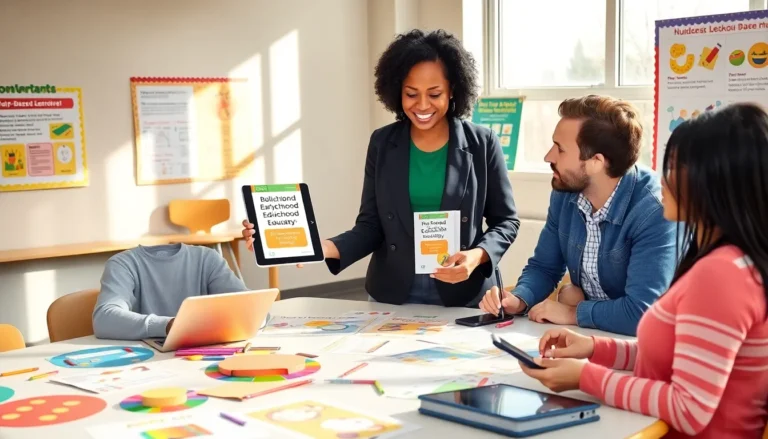Table of Contents
TogglePersonal reflections can be a delightful journey into one’s own mind, like diving into a pool of memories with a splash of humor. Everyone has those moments where they look back and think, “Did I really wear that?” or “What was I thinking?” These little nuggets of self-discovery not only entertain but also offer valuable insights into growth and change.
In a world that’s constantly pushing forward, taking a moment to pause and reflect can feel like finding a hidden treasure chest. It’s not just about reminiscing; it’s about understanding how past experiences shape who we are today. So grab a cup of coffee, settle in, and prepare to explore the art of personal reflection. It’s time to laugh, learn, and maybe cringe a little at the adventures that got us to this very moment.
The Importance of Personal Reflections
Personal reflections play a significant role in self-discovery and personal growth. Engaging with past experiences fosters understanding and can lead to meaningful insights.
Understanding Self-Reflection
Self-reflection involves examining one’s thoughts and feelings. It promotes awareness of personal values and beliefs. Individuals often discover patterns in their behavior through this practice. This exploration enhances emotional intelligence, which is vital for effective interactions. Engaging in self-reflection allows individuals to recognize achievements and areas for improvement.
Benefits of Personal Reflections
Personal reflections offer various benefits that contribute to overall well-being. Enhanced self-awareness often leads to better decision-making. Reflection promotes learning from experiences, turning past mistakes into valuable lessons. Individuals experience increased emotional resilience when they understand their responses to situations. Moreover, personal reflections can strengthen relationships by fostering empathy and understanding of oneself and others. These benefits create a foundation for continued personal growth and fulfillment.
Methods for Engaging in Personal Reflections

Engaging in personal reflections requires intentional methods to deepen self-awareness and promote growth.
Journaling Techniques
Journaling serves as a powerful tool for self-reflection. Individuals can capture their thoughts, feelings, and experiences on paper, paving the way for deeper insights. Start by setting aside time each day, even if just for a few minutes. Writing prompts can guide the process, encouraging exploration of specific memories or emotions. Many find it beneficial to write freely without editing. Regular journaling helps track patterns over time, revealing shifts in perspective and emotions, thus enhancing personal growth.
Meditation and Mindfulness Practices
Meditation fosters awareness of the present moment, significantly aiding personal reflections. Practicing mindfulness can begin with simple techniques, such as focusing on breath or observing thoughts without judgment. Engaging in guided meditations or mindful walking can deepen the experience. Several apps offer resources for structured meditation practices. By dedicating a few minutes daily, individuals may cultivate clarity and emotional regulation, leading to valuable insights about their experiences and feelings. Mindfulness enhances the ability to recognize internal patterns, promoting an understanding of one’s reaction to events.
Personal Reflections in Different Life Stages
Personal reflections vary significantly across different life stages. Each stage offers unique experiences that shape an individual’s identity and understanding of themselves.
Childhood and Adolescence
Childhood and adolescence serve as foundational periods for personal reflections. During these years, individuals often grapple with formative experiences. Memories like early friendships and family dynamics create lasting impressions. Emotional responses to challenges, such as school and peer interactions, provide vital insight into personal values. Reflection at this stage often reveals the essence of one’s character and the development of identity. Engaging in activities such as journaling or creative expression enhances this reflective process, promoting deeper self-awareness.
Adulthood and Beyond
Adulthood marks a shift towards responsibility and self-discovery. Reflecting during this stage involves examining choices that impact one’s career and relationships. Experiences such as marriage, parenthood, and career transitions evoke significant introspection. Individuals often confront lessons learned from successes and setbacks. This examination fosters emotional resilience and adapts personal beliefs over time. Practicing mindfulness and meditation can further enhance reflections during adulthood, providing a platform for continual growth and self-improvement. The journey through adulthood encourages individuals to reassess their life goals and align them with their core values.
Sharing Personal Reflections
Personal reflections serve as an insightful process for self-discovery. They deepen understanding and encourage growth through personal experiences and memories.
The Role of Vulnerability
Vulnerability plays a crucial role in personal reflection. Acknowledging weaknesses opens the door to authentic growth and healing. It allows individuals to confront fears and insecurities. By embracing vulnerability, people gain clarity about their true selves and values. This openness fosters a safe space for deeper insights and realizations. With each reflection, individuals face their past, identifying lessons learned. Acknowledging mistakes transforms experiences into valuable knowledge. Through vulnerability, personal stories emerge, highlighting resilience and strength in the face of challenges.
Building Connections Through Sharing
Sharing personal reflections fosters meaningful connections with others. When individuals express their thoughts and experiences, they invite empathy and understanding. Open conversations spark relationships founded on shared struggles and triumphs. Listening to others share their reflections creates a sense of community. Engaging in this dialogue encourages support and validation among peers. Shared experiences lead to collective growth, offering new perspectives. Each story shared enriches the group dynamic, cultivating a culture of trust. Personal reflections, when communicated, create bonds that enhance emotional well-being.
Personal reflections serve as a vital tool for self-growth and understanding. By taking the time to explore memories and feelings individuals can uncover valuable insights that shape their identities. This journey often brings laughter and learning while fostering emotional resilience.
Engaging in practices like journaling and mindfulness not only enhances self-awareness but also promotes deeper connections with others. Sharing reflections creates a community of support and empathy that enriches relationships. Ultimately embracing personal reflections can lead to a more fulfilling life filled with purpose and clarity.




